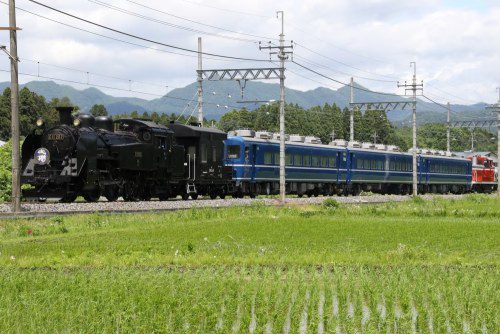
SL Taiju in Spring
With the Aims to Preserve Japan’s Railroad Cultural Heritage, Reach Toward Future Carbon Neutrality, and Promote More Sustainable Tourism, Tobu Railway is Experimenting with Replacing Part of its Coal Fuel Used by its SL Taiju Steam Locomotive with Bio-Coke Derived from Plant-based Materials.
Tobu Railway has begun a demonstration experiment to replace part of its coal fuel used to power its “SL Taiju” Steam Locomotive, with bio-coke derived from plant-based materials.
The aim is to achieve carbon neutrality in the future. This will be the first time in Japan that biofuel will be used for the SL “steam locomotive.” In this experiment, 40% of the fuel will be replaced with bio coke in a fire retention process, in which coal is constantly burned to maintain and protect the pressure of the SL boiler.
In addition, approximately 50% of the diesel oil fuel for DL Taiju “diesel locomotive,” will be replaced with biodiesel fuel blended diesel oil “B5.”
This is expected to reduce CO2 emissions by more than 150 tons per year – equivalent to the annual CO2 emissions of about 50 average households.

SL-Taiju-Passing-Rice-Fields
The SL Taiju started its revival operation on August 10, 2017, with the aim of “preserving and utilizing railway industrial cultural heritage” and “creating new regional tourism vitality,” centering on the Nikko and Kinugawa areas of Tochigi Prefecture (about two hours north of Tokyo). Currently, it has served approximately 490,000 passengers. Through this initiative, Tobu aims to reduce CO2 emissions and make the SL operation more sustainable.
Based on the results of this experiment, a full-scale operation will be considered moving forward. In the future, Tobu Bus Nikko, which operates biofuel buses in the Nikko area, aims to establish a “local production for local consumption” energy cycle.
The Test period began on January 31, 2024, and will last approximately one year (tentative).



















